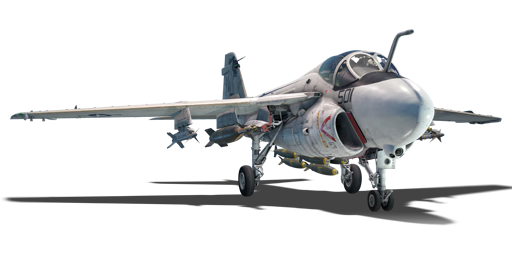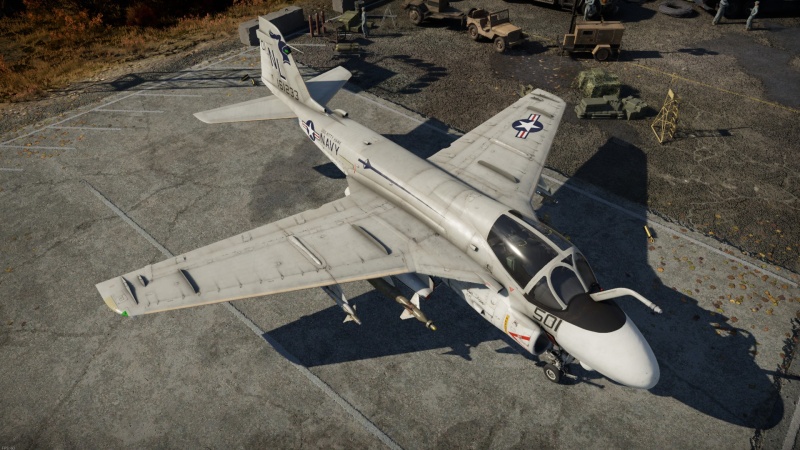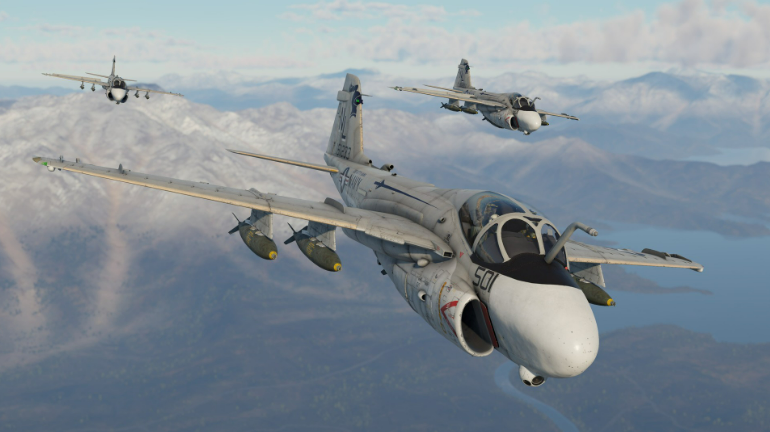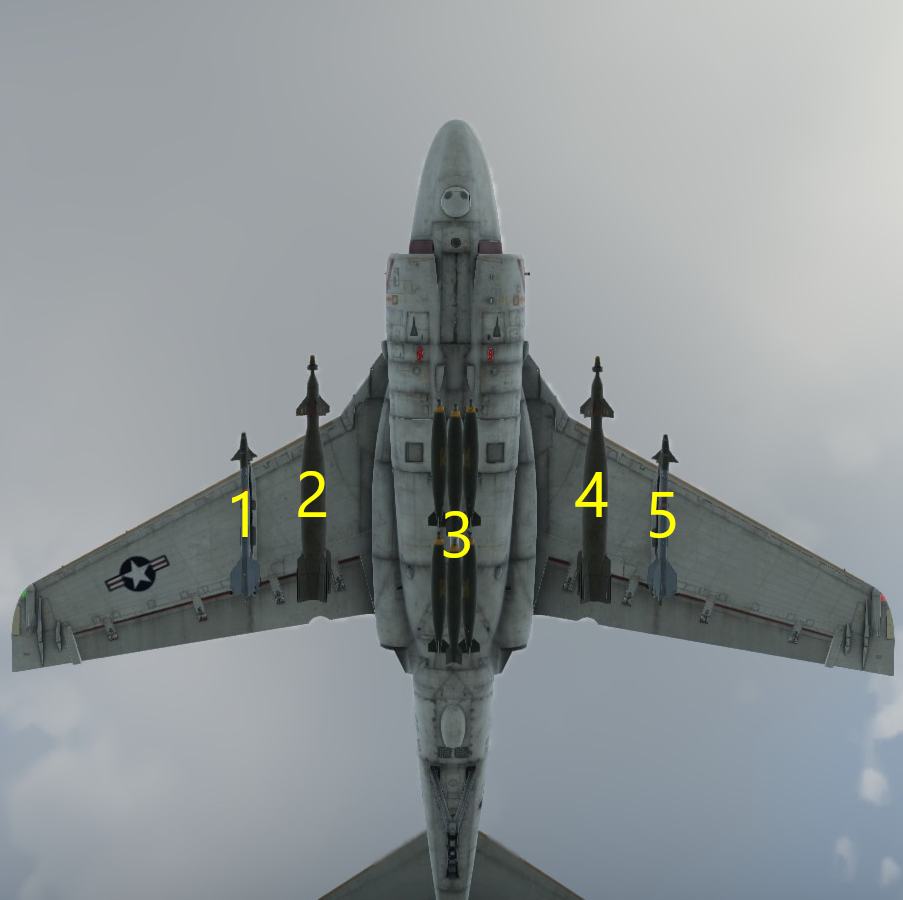Difference between revisions of "A-6E TRAM"
Colok76286 (talk | contribs) (Removed store number) |
Colok76286 (talk | contribs) (Undo revision 194862 by U153897264 (talk)) |
| (One intermediate revision by one other user not shown) | |
(No difference)
| |
Latest revision as of 20:50, 11 November 2024
Contents
Description
The obsolescence of the AD/A-1 Skyraider attack aircraft led to the search for a new plane able to satisfy both US Navy (USN) and US Marine Corps (USMC) requirements. Aside from the type of engine, the new plane was to be capable of all-weather operations. Grumman was one of eleven companies that sent their designs for selection, and Grumman's design was selected in January 1958 as the YA2F-1. Following development and testing, the YA2F-1 was accepted into the US Navy in February 1963 as the A-6 Intruder. Following experiences in the Vietnam War, the A-6 went through multiple variants featuring improvements or for specialized roles. The A-6E was introduced in December 1972 with better navigation, attack, and radar equipment. It featured another enhancement in 1979 with the Target Recognition and Attack Multi-sensors (TRAM) system, which enabled better targeting abilities for improved munition accuracy. The A-6E Intruder and its variants continued serving the US Navy in most combat operations from the Vietnam War onwards, including the 1991 Gulf War. All Intruders were retired by February 1997.
Introduced in Update "Apex Predators", the premium A-6E TRAM is one of the more unique aircraft in the game as it does not come with any native weapons. The weapon it brings into the battle is dependent on five hard points that players are able to customize. The assortment of weapons is quite remarkable, with smart weapons like guided bombs not needing a targeting pod due to the TRAM system installed in the aircraft. That said, the A-6E TRAM is subsonic-only, so it cannot get to the battlefield quickly and falls closer to the category of A-10s and Su-25s. However, if the battlefield calls for very specific loadout requirements, the A-6E can provide that kind of flexibility to bring only what is essential to the needs of the battlefield.
General info
Flight performance
Describe how the aircraft behaves in the air. Speed, manoeuvrability, acceleration and allowable loads - these are the most important characteristics of the vehicle.
| Characteristics | Max speed (km/h at 12,300 m) |
Max altitude (metres) |
Turn time (seconds) |
Rate of climb (metres/second) |
Take-off run (metres) | |||
|---|---|---|---|---|---|---|---|---|
| AB | RB | AB | RB | AB | RB | |||
| Stock | 1,047 | 1,041 | 12300 | 50.2 | 51.2 | 35.1 | 32.4 | 1,100 |
| Upgraded | 1,063 | 1,055 | 48.1 | 49.0 | 53.9 | 44.0 | ||
Details
| Features | |||||
|---|---|---|---|---|---|
| Combat flaps | Take-off flaps | Landing flaps | Air brakes | Arrestor gear | Drogue chute |
| X | ✓ | ✓ | ✓ | ✓ | X |
| Limits | ||||||
|---|---|---|---|---|---|---|
| Wings (km/h) | Gear (km/h) | Flaps (km/h) | Max Static G | |||
| Combat | Take-off | Landing | + | - | ||
| 1,322 | 460 | N/A | 555 | 510 | ~__ | ~__ |
| Optimal velocities (km/h) | |||
|---|---|---|---|
| Ailerons | Rudder | Elevators | Radiator |
| < ___ | < ___ | <900 | N/A |
Engine performance
| Engine | Aircraft mass | |||||||
|---|---|---|---|---|---|---|---|---|
| Engine name | Number | Basic mass | Wing loading (full fuel) | |||||
| Pratt & Whitney J52-P-8As | 2 | 12,647 kg | ___ kg/m2 | |||||
| Engine characteristics | Mass with fuel (no weapons load) | Max Gross Weight | ||||||
| Weight (each) | Type | 17m fuel | 20m fuel | 30m fuel | 45m fuel | 57m fuel | ||
| 654 kg | Axial-flow turbojet | 14,816 kg | 15,164 kg | 16,422 kg | 18,309 kg | 19,876 kg | 26,602 kg | |
| Maximum engine thrust @ 0 m (RB/SB) | Thrust to weight ratio @ 0 m (100%) | |||||||
| Condition | 100% | WEP | 17m fuel | 20m fuel | 30m fuel | 45m fuel | 57m fuel | MGW |
| Stationary | 3,796 kgf | N/A | 0.51 | 0.50 | 0.46 | 0.41 | 0.38 | 0.29 |
| Optimal | 3,796 kgf (0 km/h) |
N/A | 0.51 | 0.50 | 0.46 | 0.41 | 0.38 | 0.29 |
Survivability and armour
Examine the survivability of the aircraft. Note how vulnerable the structure is and how secure the pilot is, whether the fuel tanks are armoured, etc. Describe the armour, if there is any, and also mention the vulnerability of other critical aircraft systems.
Modifications and economy
Armaments
| Ballistic Computer | |||
|---|---|---|---|
| CCIP (Guns) | CCIP (Rockets) | CCIP (Bombs) | CCRP (Bombs) |
| |
|
|
|
Offensive armament
The A-6E TRAM is armed with:
- 60 x countermeasures
Suspended armament
The A-6E TRAM can be outfitted with the following ordnance:
| 1 | 2 | 3 | 4 | 5 | ||
|---|---|---|---|---|---|---|
| 20 mm Mk 11 mod 5 cannons (750 rpg) | 1 | 1 | 1 | 1 | ||
| 250 lb LDGP Mk 81 bombs | 6 | 5 | 6 | 5 | 6 | |
| 250 lb Mk 81 Snakeye bombs | 6 | 5 | 6 | 5 | 6 | |
| 500 lb LDGP Mk 82 bombs | 6 | 5 | 6 | 5 | 6 | |
| 500 lb Mk 82 Snakeye bombs | 6 | 5 | 6 | 5 | 6 | |
| 1,000 lb LDGP Mk 83 bombs | 3 | 2 | 3 | 2 | 3 | |
| 2,000 lb LDGP Mk 84 bombs | 1 | 1 | 1 | 1 | 1 | |
| 2,000 lb LDGP Mk 84 Air bombs | 1 | 1 | 1 | 1 | 1 | |
| Mk 77 mod 4 incendiary bombs | 2 | 2 | 2 | 2 | 2 | |
| 277 kg GBU-12 Paveway II bombs | 2 | 2 | 1 | 2 | 2 | |
| 957 kg GBU-10 Paveway II bombs | 1 | 1 | 1 | 1 | 1 | |
| 1,092 lb GBU-16 Paveway II bombs | 1 | 1 | 1 | 1 | 1 | |
| FFAR Mighty Mouse rockets | 57 | 38 | 38 | 57 | ||
| Zuni Mk32 Mod 0 ATAP rockets | 12 | 8 | 8 | 12 | ||
| AGM-123 Skipper missiles | 1 | 1 | 1 | 1 | ||
| AIM-9G Sidewinder missiles | 1 | 1 | 1 | 1 | ||
| AIM-9L Sidewinder missiles | 1 | 1 | 1 | 1 | ||
| Countermeasures | 240 | 240 | 240 | 240 |
| Default weapon presets | |
|---|---|
| |
Usage in battles
Describe the tactics of playing in the aircraft, the features of using aircraft in a team and advice on tactics. Refrain from creating a "guide" - do not impose a single point of view, but instead, give the reader food for thought. Examine the most dangerous enemies and give recommendations on fighting them. If necessary, note the specifics of the game in different modes (AB, RB, SB).
Pros and cons
Pros:
- Very large air-to-ground payloads, with many choices for suspended weaponry
- Access to excellent AIM-9L all-aspect air-to-air missiles
- Decent flight characteristics when lightly loaded makes it viable in dogfights
- Built-in TRAM turret provides FLIR and laser-targeting capabilities
- Highly customizable secondary weapons due to the large variety of guided bombs, rockets, gunpods, air-to-air missiles and more which allows a loadout appropriate to almost any fight
Cons:
- No internal gun; taking gun pods or air-to-air missiles for self-defense reduces payload amount
- Loses speed very quickly in turns
- Gunpods have poor accuracy and are wing-mounted (convergence issue)
- TRAM turret cannot look fully backwards
- Relatively low top speed, acceleration and climb rate, especially when carrying heavy payloads due to it being a subsonic jet
- Poor handling at high speeds, causing stall very easily, especially when climbing
- Subsonic jet which makes it slower than other jets at its battle rating, making it difficult to outrun and maneuver most supersonic jets
History
Describe the history of the creation and combat usage of the aircraft in more detail than in the introduction. If the historical reference turns out to be too long, take it to a separate article, taking a link to the article about the vehicle and adding a block "/History" (example: https://wiki.warthunder.com/(Vehicle-name)/History) and add a link to it here using the main template. Be sure to reference text and sources by using <ref></ref>, as well as adding them at the end of the article with <references />. This section may also include the vehicle's dev blog entry (if applicable) and the in-game encyclopedia description (under === In-game description ===, also if applicable).
Media
- Skins
- Videos
See also
Links to the articles on the War Thunder Wiki that you think will be useful for the reader, for example:
- reference to the series of the aircraft;
- links to approximate analogues of other nations and research trees.
External links
| Grumman Aircraft Engineering Corporation | |
|---|---|
| Aircraft | |
| Fighters | |
| F3F | F3F-2 · Galer's F3F-2 |
| F4F Wildcat | F4F-3 · F4F-4 |
| XF5F Skyrocket | XF5F · XP-50 |
| F6F Hellcat | F6F-5 · F6F-5N |
| F7F Tigercat | F7F-1 · F7F-3 |
| F8F Bearcat | F8F-1 · F8F-1B |
| Jet Fighters | |
| F9F Panther/Cougar | F9F-2 · F9F-5 · F9F-8 |
| F-11 Tiger | F11F-1 |
| F-14 Tomcat | F-14A Early · F-14B |
| Jet Strike Aircraft | |
| A-6 Intruder | A-6E TRAM |
| Bombers | TBF-1C |
| Export | ▄Martlet Mk IV · ▄F6F-5 · ▄F6F-5N · ▄F8F-1B · ▄Avenger Mk II · ▄Hellcat Mk II |
| ▄F-14A IRIAF | |
| Naval Vehicles | |
| Patrol Gunboat Hydrofoil (PGH) | USS Flagstaff |
| USA jet aircraft | |
|---|---|
| Fighters | |
| F9F | F9F-2 · F9F-5 · F9F-8 |
| F-80 | F-80A-5 · F-80C-10 |
| F-84 | F-84B-26 · F-84F · F-84G-21-RE |
| F-86 | F-86A-5 · F-86F-25 · F-86F-2 · F-86F-35 |
| F-89 | F-89B · F-89D |
| F-100 | F-100D |
| F-104 | F-104A · F-104C |
| F-4 | F-4C Phantom II · F-4E Phantom II · F-4J Phantom II · F-4S Phantom II |
| F-5 | F-5A · F-5C · F-5E · F-20A |
| F-8 | F8U-2 · F-8E |
| F-14 | F-14A Early · ▄F-14A IRIAF · F-14B |
| F-15 | F-15A · F-15C MSIP II · F-15E |
| F-16 | F-16A · F-16A ADF · F-16C |
| Other | P-59A · F2H-2 · F3D-1 · F3H-2 · F4D-1 · F11F-1 |
| Strike Aircraft | |
| FJ-4 | FJ-4B · FJ-4B VMF-232 |
| A-4 | A-4B · A-4E Early |
| A-7 | A-7D · A-7E · A-7K |
| AV-8 | AV-8A · AV-8C · AV-8B Plus · AV-8B (NA) |
| A-10 | A-10A · A-10A Late · A-10C |
| F-111 | F-111A · F-111F |
| Other | A-6E TRAM · F-105D · F-117 |
| Bombers | |
| B-57 | B-57A · B-57B |
| USA premium aircraft | |
|---|---|
| Fighters | Thach's F2A-1 · Galer's F3F-2 · F2G-1 · F4U-4B VMF-214 · P-26A-34 · Rasmussen's P-36A · P-40C · P-43A-1 |
| P-47M-1-RE · ⋠P-47M-1-RE · P-51A · P-51D-10 · P-51D-20-NA · ␠Kingcobra · XP-55 | |
| ▃A6M2 · ▃Ki-43-II · ▃Ki-61-Ib · ▃Bf 109 F-4 · ▃Fw 190 A-8 · ▃Spitfire LF Mk IXc | |
| Twin-engine fighters | XP-38G · Bong's P-38J-15 · P-38K · YP-38 · P-61A-11 · XF5F · XP-50 · F7F-3 |
| Jet fighters | P-59A · F-86F-35 · F-89B · F-89D · F-4S Phantom II · F-5C · F-20A |
| Strike aircraft | A-1H · A2D-1 · AU-1 · XA-38 · AV-8A · AV-8B (NA) · A-6E TRAM · A-10A |
| Bombers | A-26C-45DT · B-10B · BTD-1 · PBM-3 "Mariner" · PBM-5A "Mariner" · PV-2D |







